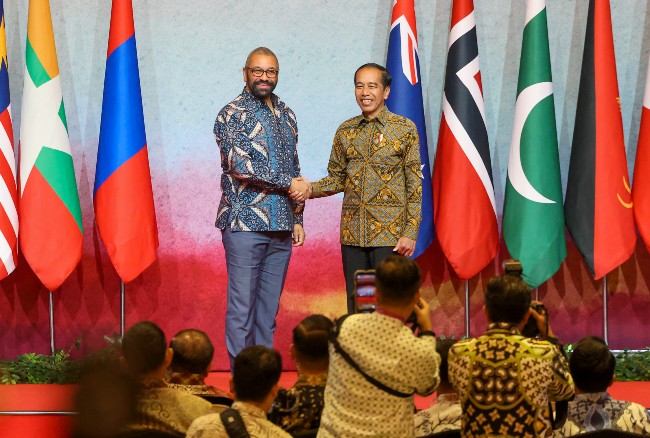Centre equity to create enduring UK-ASEAN Relations

The UK Government has set out suitable priorities and frameworks for engagement in Southeast Asia. It now needs to translate these into concrete programmes and develop relationships at different scales to produce sustainable and equitable partnerships.
As part of a research project exploring the UK’s “Indo-Pacific tilt”, the ‘UK-ASEAN Relations: Towards sustainable, enduring, and equitable partnerships’ IdeasLab took place at the Asia Centre in Bangkok, Thailand. The IdeasLab brought together 30 practitioners and researchers working in government, research and civil society across Southeast Asia to discuss UK engagement with the region with a focus on functional areas of cooperation. This briefing outlines the key findings of the event and provides policy recommendations for the UK Government.
Policy recommendations
1. Translate the frameworks for the UK’s contribution into concrete, inclusive programmes:
- Establish the UK Centres of Expertise outlined in the International Development Strategy.
- Include local communities in projects, as outlined in the International Climate Finance Strategy.
- Create more opportunities for people-to-people links, through increasing scholarships and support for the UK-ASEAN Business Council.
2. Avoid the perception of only having geopolitical interests:
- Direct security cooperation towards functional areas of cooperation and capacity building.
- Explore acceding to the treaty on Southeast Asia as a Nuclear Weapon Free Zone to demonstrate commitment to ASEAN’s regional security role.
- Continue to emphasise the importance of ASEAN Centrality in security cooperation through the ASEAN Regional Forum and ASEAN Defence Ministers’ Meeting+.
- Intensify digital diplomacy about the UK’s non-geopolitical defence activities to improve awareness about the UK’s contribution.
3. Increase diplomatic engagement at all levels.
- Increase engagement with local governments, communities, and Micro-, Small and Medium-sized Enterprises impacted by UK programmes.
- Create and sustain more robust internal inter-agency and inter-departmental structures.
- Create and sustain external mechanisms of coordination with ASEAN and partners to avoid duplication and support learning.
- Provide cultural competence training for British officials to include recognising the role of informal diplomacy and the value of reciprocal learning.
Key Findings
1. The frameworks for deeper UK-ASEAN relations are in place but more concrete capacity-building programmes are required.
IdeasLab participants broadly aligned with the UK government’s approach to invest in three priorities: building partnerships that deliver results; catalytic investments that leverage larger investments from others; and UK expertise to provide advice, exchange lessons, and evidence.
Key areas of cooperation highlighted by participants for investments were green and sustainable infrastructure; digital connectivity; green finance and environmental, social, and corporate governance (ESG) regulation; cyber-security; education; maritime domain awareness; and marine environment. Opportunities were highlighted as:
- Inclusive partnerships when designing programmes - engaging beyond the ASEAN and national government level to engage with local governments, civil society, local communities & industry. This would support inclusivity in capacity building and investment.
- Recognising the limitations of private finance for public infrastructure - participants highlighted the need for strong regulation and capacity building in areas of human resources, leadership, regulation, and governance. A recent report calls for a shift away from centring of private finance and to a social, environment and human rights-focused approach. There is also a need to prioritise women-led green finance initiatives.
- Mutual learning – The offer of UK expertise was welcomed by participants, but mutual learning was highlighted as insufficient.
2. The UK’s activities may contribute to security challenges in the region.
Participants noted widespread concern regarding the over-militarisation of the South China Sea. Although China’s territorial claims are behind tensions, the increasing presence of outside powers means an increased risk of conflict.
Whilst the UK is drawing attention to its defence relationships within the wider Indo-Pacific, messaging about activities aligning with regional needs is not as consistent.
3. UK diplomacy and presence in Southeast Asia can be improved.
The UK government is seen as slow to respond. Participants noted the regional presence of UK representatives is minimal, especially compared to China. A relative lack of engagement across different scales was seen as a barrier to the inclusive development agenda and priorities.
Many areas of cooperation are considered to be cross-departmental, cross-sectoral, or whole-of-system, but current mechanisms for intra-government coordination are lacking. This can undermine the unity behind the UK’s diplomatic engagement with the region.
Further Information
Image credit: 14/07/2023. Jakarta, Indonesia. Former Foreign Secretary, James Cleverly meets with President Widodo of Indonesia whilst attending the Association of Southeast Asian Nations (ASEAN) Foreign Ministers Summit in Jakarta, Indonesia. Picture by Rory Arnold / No 10 Downing Street
Authors
Robert Yates, Scott Edwards
Contact the researchers
Robert Yates
Scott Edwards


